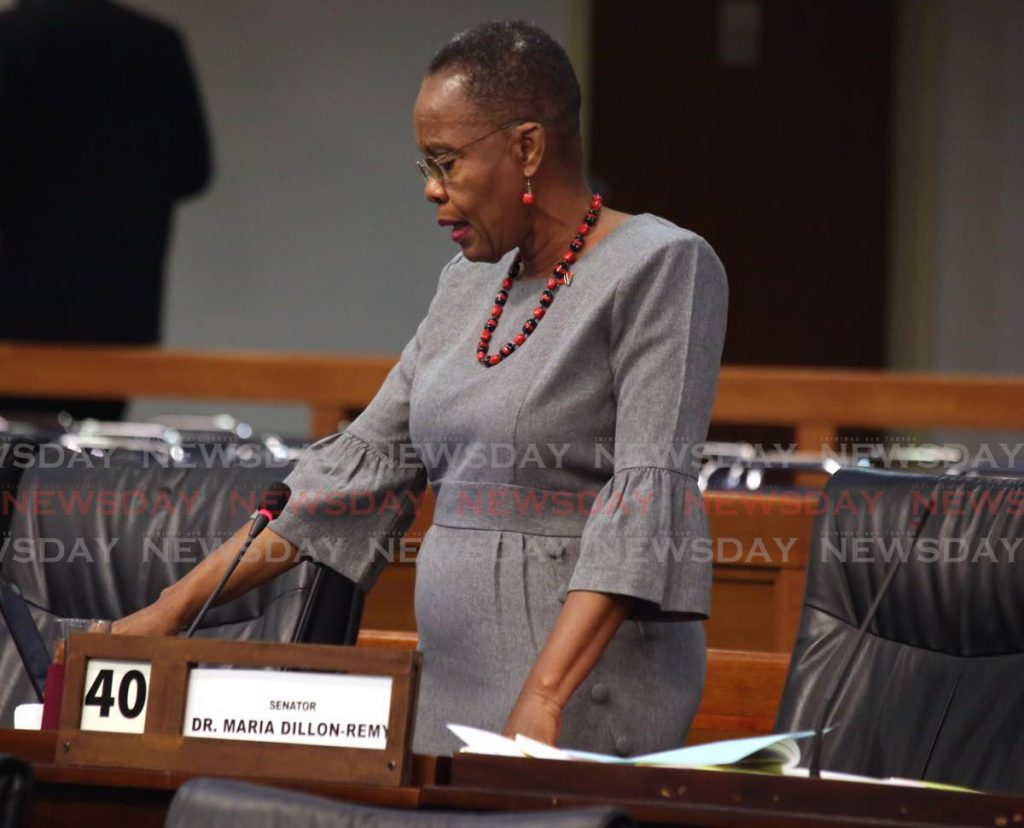‘Too many unclear answers’

Independent Senator Dr Maria Dillon-Remy felt quite at ease being the only member of both Houses of Parliament to not vote in support of the Dangerous Drugs (Amendment) Bill to decriminalise cannabis for personal use.
As the only one of 72 members of the Senate plus House of Representatives to abstain, she said she had not felt any need to go along with the PNM or UNC, nor her Independent colleagues. “I did not think I would have to go with the trend because that is why we are there as independents.”
As to why she had abstained, Dillon-Remy said she was not confident in some of the answers she had heard during the Senate debate. “Some questions were asked especially at committee stage such as where would people buy cannabis, but there was no answer that was very clear. There is still not a clear answer.
“You are saying people can have it, so in other words where you got it from before continue to get it from there, once you have less than 30 grammes.”
Dillon-Remy also queried the bill’s allowance of four cannabis plants per person. “At first I was thinking this was four plants per household, but when it was asked in committee stage it was pointed out that this was per adult, so you could have about 20 plants or 40 plants per household, depending on the number of adults there.
“At that point in time I said no. This is not going to be controlled properly, and therefore the other bill on cannabis control was needed if the first bill was to be assented to.” Dillon-Remy was fine with the bill’s provision to free inmates for cannabis possession offences, but reckoned the bill should have waited until full answers were given as to the number of trees in your home and how people are to be licensed to sell cannabis.
“I thought that should have waited until that other bill (Cannabis Control Bill) was discussed and passed,” she related. “I did not think we were ready.”
Dillon-Remy was also concerned about decriminalising cannabis before the State has launched a public education campaign.
“I thought we should have had the opportunity for education, particularly the young people. But the bill has already been passed. Now it is an Act, people are supposed to be knowledgeable about what is the law.
“In the debate it was agreed there would be a need for a lot of education. That is going to happen now, after the bill has been assented to. It will have to happen very quickly. People need to be educated.”
She said Health Minister Terrence Deyalsingh had said NADAP would visit schools in such a campaign. “I’d have preferred to see it happening before you assent to the Act.” Dillon-Remy said the Bill could have got assent part by part. “I abstained because I was not confident.”
Asked by Newsday, she had not heard of any funding provision being given to the Health Ministry for such a campaign, but reckoned such provision would be made.
“There is also a concern about resources available for people to be properly rehabilitated.” She wanted to stop recidivism by current cannabis offenders.
Asked about any harmful effects of cannabis, Dillon-Remy reckoned that issue might be discussed in the debate on the Cannabis Control Bill. Otherwise she said her research had said deleterious effects were more likely the younger the user was and the longer time he had been using it as a youngster.
During debate, Dillon-Remy said cannabis can disrupt brain development in the young, cause memory loss and impulsiveness, and increase the risk of stroke, cancer and heart attacks. Asking if decriminalisation would lead to more youngsters trying cannabis, she urged that rather than making usage seem sexy, the message should be that drug use is not good for you and is undesirable.
The Senate passed the Dangerous Drugs Act on Friday 13 December, and its amendments were sent back to the House after which the President of the Republic proclaimed it on December 23. The Cannabis Control Bill to regulate the industry will be debated by a Joint Select Committee in 2020. Dillon-Remy is a Tobago-based general paediatrician.


Comments
"‘Too many unclear answers’"